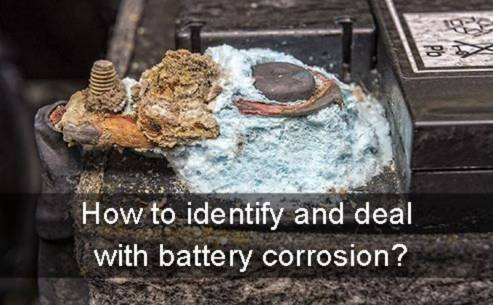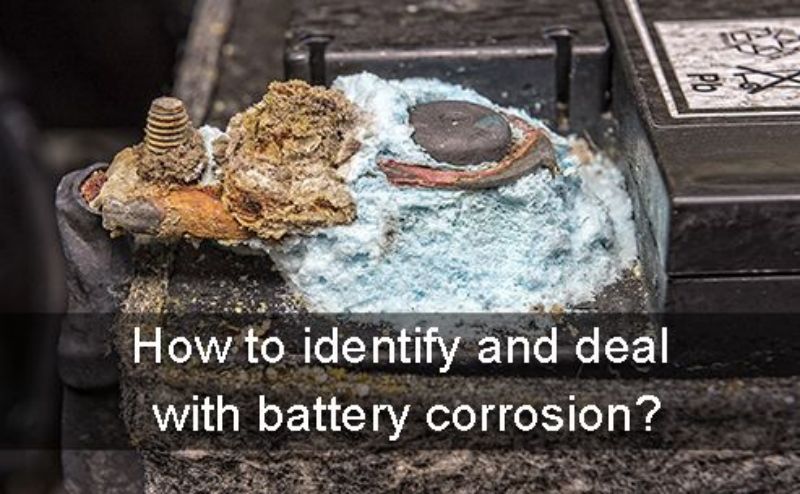
Main content:
- 1. What does battery corrosion look like? Does corrosion mean a bad battery?
- 2. What causes battery corrosion? How to stop further battery corrosion?
- 3. Does battery corrosion ruin electronics?
- 4. How do you fix a corroded battery?
- 5. How do you clean battery corrosion off? Does hydrogen peroxide clean battery corrosion?
- 6. Can corroded terminals drain the battery? How do you keep battery terminals corrosion-free?
- 7. What happens if you touch battery corrosion? Is battery corrosion toxic?
You may have seen battery corrosion if you've ever noticed odd green splotches on your laptop, mobility scooter batteries, or anything else with a battery inside. It's not always easy to distinguish between corrosion and simply old age. Battery corrosion is a gradual, progressive condition that goes through several stages. Generally speaking, corrosion on batteries begins as a green tint but lightens to yellow and then dark brown over time. Battery corrosion may occur after just a few years of service, and it always look bad. Let's see some questions surrounding the battery corrosion theory and how to settle them.
1. What does battery corrosion look like? Does corrosion mean a bad battery?
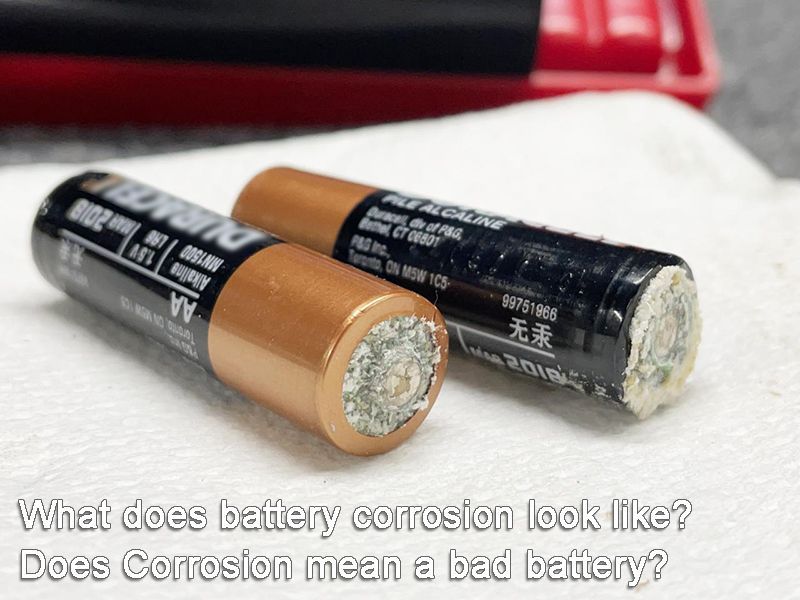
Battery corrosion occurs in the use of anode plate grid damage, resulting in the end of battery life, called battery corrosion. Corrosion is generally confined to the contact point and may form deep grooves or spots on the anodic metal, and it normally looks like a flaky layer of brown, white, or green discoloration that sits on your battery terminals. That means that you will have to look closely at the battery to have a definitive answer. Green splotches result from leakage in the seam between the cells of the battery and are generally benign if they don't spread past the plastic housing.
In our daily life, corrosion tends to appear more frequently in warm, humid areas around windows, doors, or with maximum exposure to sunlight. If Corrosion is found on batteries, it doesn't necessarily mean that the battery is bad, it all depends on the specific condition of battery corrosion. If only the local corrosion of the battery, it can be used after polishing and cleaning. However, if battery leakage occurs, It can no longer be used because the chemicals used to generate electricity in the battery have been exhausted, and it will corrode the metal components of the electrical appliance.
2. What causes battery corrosion? How to stop further battery corrosion?
The causes of battery corrosion are not the same for each battery. Some batteries are more vulnerable to Corrosion than others. For example, the main raw materials of the lead-acid battery are lead and its oxides, and sulfuric acid solution is generally used as the electrolyte inside the battery. The battery is charged and discharged through the chemical reaction of lead compounds with sulfides.As the electrolyte of lead-acid battery is highly corrosive sulfuric acid, the corrosion of battery components will become more and more serious with the increasing concentration of electrolyte in the process of use, eventually leading to the continuous reduction of battery life.
Whereas lithium batteries generally use lithium or its compounds as the electrode material of the battery, and use non-hydrolysate as electrolyte, currently common lithium battery electrolyte is mainly gel. Due to the high stability of the structure of lithium battery, it is not easy to corrosion of parts, and the consumption rate of electric ions in the battery is slow, which leads to the service life of lithium battery is much longer than that of lead-acid battery.
You can stop further corrosion by keeping the battery dry. Generally speaking, batteries can only be cleaned by an expert from the outside, but you can clean them inside if you know where corrosion is. It should be noted that nobody should attempt this unless you have prior experience or unless you have instructions from a professional or from a reputable website on how to do this.
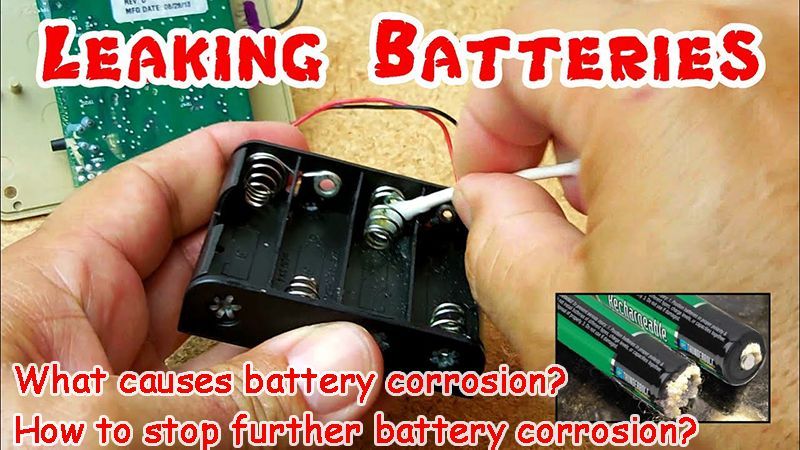
3. Does battery corrosion ruin electronics?
The answer is uncertain and depends on the specific conditions of battery corrosion. Corrosion of electrical appliances is mainly due to the shell corrosion after damage, electrolyte leakage will occur. The cause of electric equipment damage is usually the electrolyte leakage phenomenon of the battery is overused or placed for too long, the electrical shell is damaged after corrosion, and the electrolyte leakage corrodes electrical circuits, resulting in electrical appliances damage. Moreover, the cause of battery corrosion may also be that the positive and negative electrodes may be in direct contact with the metal shell, which will destroy the original passivation film under certain conditions and cause battery corrosion.
4. How do you fix a corroded battery?
You can be taken care of Corrosion with ease and provided with the appropriate information. If Corrosion is found on the outside of a battery, keep it dry and ensure that you don't allow any moisture to get in. These are easily done and should not be overlooked if you have an old battery around. If Corrosion is found inside the battery, the process is more complicated. This usually happens with lead-acid batteries, so here's what you need to do. It includes cleaning the battery cells and removing the Corrosion from them. The first thing you would have to do is drain the battery completely. Then, unscrew the cell caps.
Clean up any old rusted components with a brush and a rust remover or if you have access to an ultrasonic cleaner, use it. After this step, clean up any acid that has dried onto the inside of the case, then remove all slime and debris with a wire brush and clean water. This can be done in the open air or after being put into a vacuum cleaner. If you don't have access to water, then you can use a saline solution and any mechanical tool that you can use. If you want to avoid these complicated cleaning steps, you can buy lithium-ion batteries instead of lead-acid batteries since lithium-ion batteries have few of these problems.
5. How do you clean battery corrosion off? Does hydrogen peroxide clean battery corrosion?
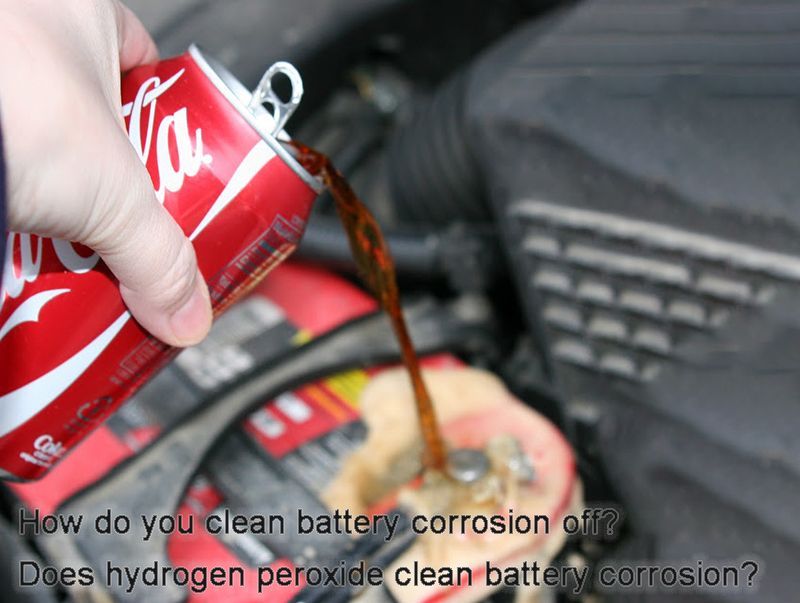
Battery corrosion has been known to destroy electronic equipment and other items used with batteries, so it is important to ensure that they are completely free of Corrosion before they are used again. The easiest way to clean Corrosion off an item is with a plain soap and water solution. To do this, use isopropyl alcohol and some water to wash the area thoroughly. There are many other methods that you can use when cleaning Corrosion off of batteries, but there may be more effective methods out there as well. Hydrogen peroxide can be used to clean battery corrosion in conjunction with a semi-perm solution if small in size. A battery can also be cleaned with a strong acid if it has been completely dry.
6. Can corroded terminals drain the battery? How do you keep battery terminals corrosion-free?
The terminals of a battery can be very corrosive, especially when exposed to moisture. This can lead to problems such as poor connections and weak power signals. Corroded terminals can also lead to a rapid discharge of batteries leading to draining, which can be very inconvenient in the case of car batteries. The good news is that you can easily clean Corrosion from battery terminals. You have to use baking soda and water or a similar mild alkaline solution. Sulfuric acid cleaners are also effective at removing Corrosion from battery terminals; however, they can be dangerous and corrosive enough to cause electrocution if proper protective measures aren't taken.
One of the causes of battery terminal corrosion is that the battery is overcharged or undercharged. The manufacturer's manual usually has recommended battery voltages. The best way to prevent corrosion of battery terminals is to ensure that the battery is not overcharged, in addition, anti-corrosion spray can also play a role in preventing corrosion. Since a leaking battery can cause a lot of battery corrosion, you may need to replace the battery to prevent it from happening again soon.
7. What happens if you touch battery corrosion? Is battery corrosion toxic?
Since battery corrosion is caused by acid, there is a risk of skin injury. Losing control of your hand and touching the battery may lead to an electric shock if the loose metal parts contact your bare skin. You should also be careful when working around batteries if you have any sensitive skin conditions. Batteries containing sulfuric acid, hydrogen peroxide (H2O2), car batteries, and gases can be toxic if ingested or improperly handled. These batteries should be stored safely and in a dry environment to ensure that toxic fumes are not released. Batteries seem to be getting worse day by day.
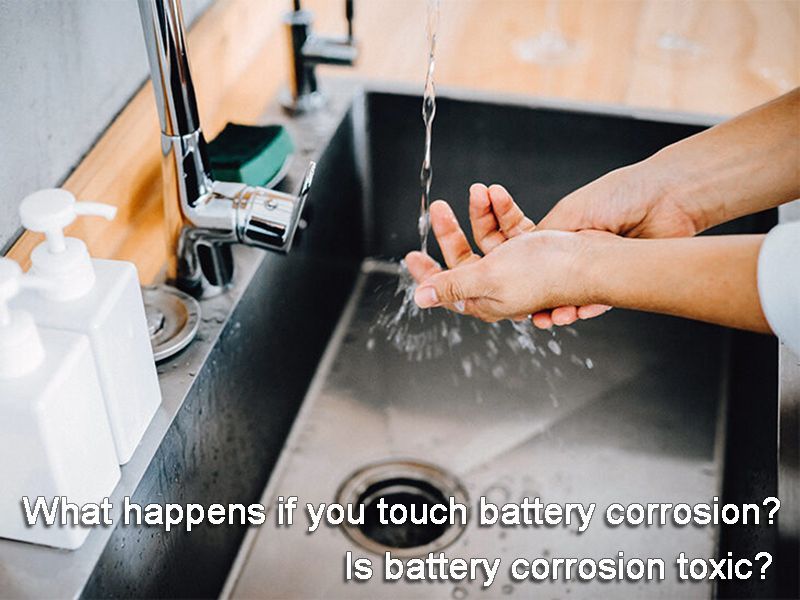
Batteries left in their charger overnight or placed in a warm car can cause the lead-acid battery to take an irreversible toll and become useless before its end life. Battery life can be prolonged by charging it with a battery maintainer rather than direct current like normal chargers do. But it is worth mentioning that lithium-ion batteries with the characteristics of maintenance-free consume very little electrolyte, saving the cost of battery maintenance and management. In addition, the life of lithium batteries is 3 times that of lead-acid batteries, its battery cycle can up to 4,000 cycles, so its cost performance is higher than that of traditional lead-acid batteries.


